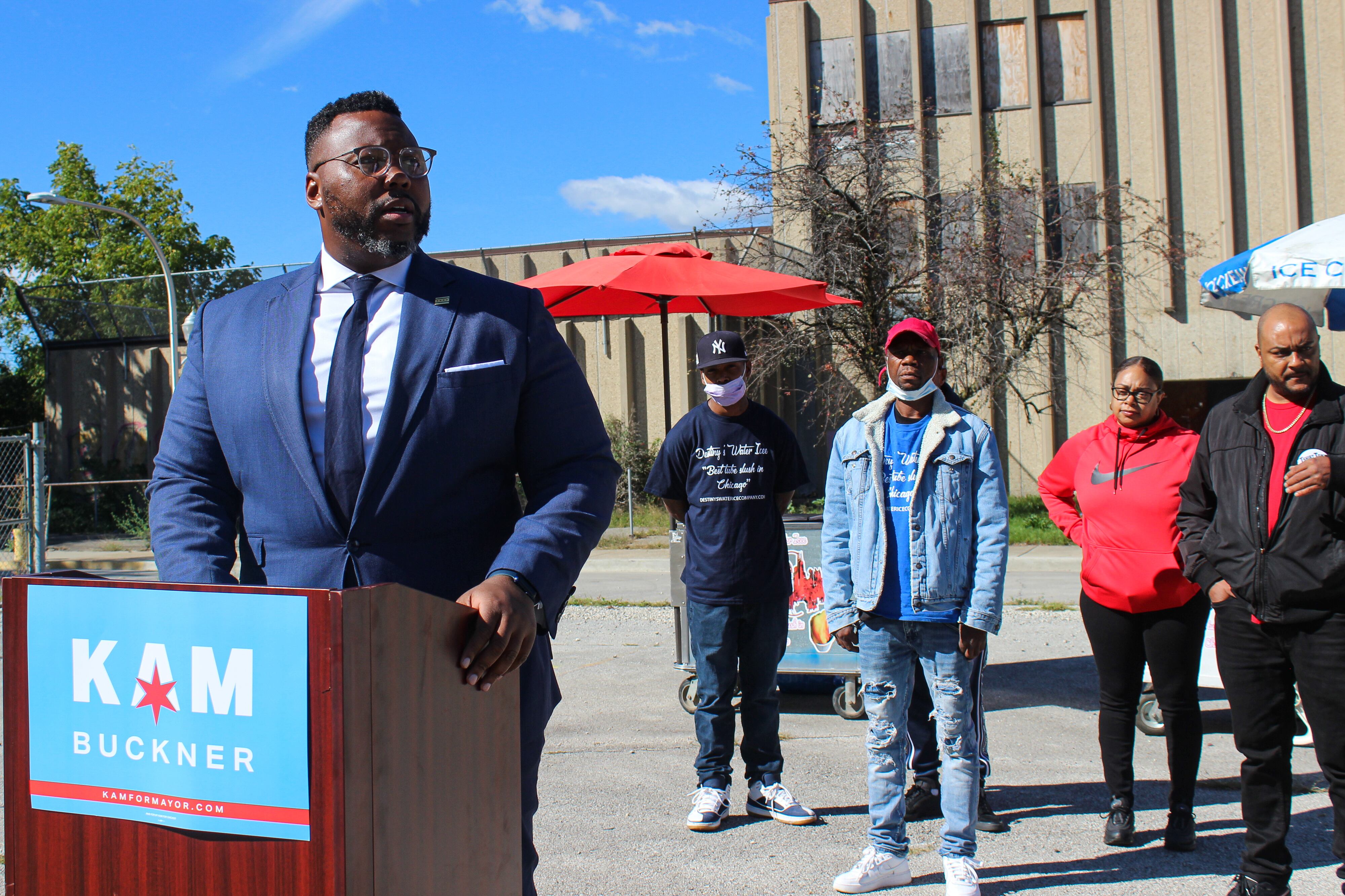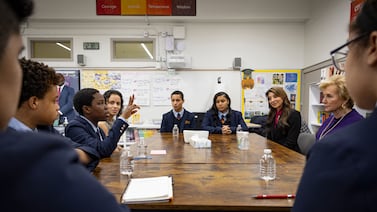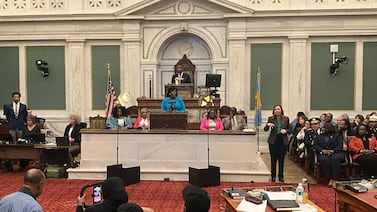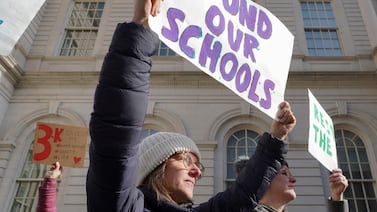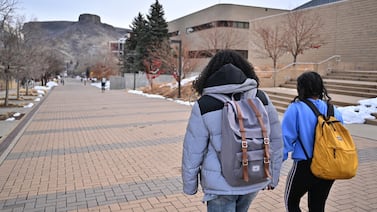Mayoral hopeful Kambium “Kam” Buckner is promising to transform Chicago Public Schools by funding schools based on need, not enrollment; staffing every school with a nurse, librarian, and social worker; and expanding universal preschool to all 3-year-olds.
Buckner is the first 2023 mayoral candidate to hold an event releasing his education platform. He detailed the plan outside the shuttered Laura S. Ward Elementary School in Garfield Park on the West Side, one of the 50 schools closed in 2013 by then-Mayor Rahm Emanuel.
Buckner is one of seven people planning to challenge Mayor Lori Lightfoot, who is seeking a second term. Three aldermen and former CPS CEO Paul Vallas are among the candidates.
The Chicago Teachers Union has yet to throw their support behind a candidate. Cook County Commissioner Brandon Johnson, a former teacher and union organizer, last month said he was exploring a possible run for mayor.
If elected mayor, Buckner said he plans to change how schools within the district are funded.
“As mayor, I will continue to work with Springfield to hold CPS accountable for directing state funds to schools based on need, and not on any other criteria,” Buckner said, adding that funding should not be strictly based on enrollment.
Currently, schools get a set amount of money per student, plus a few centrally-funded positions, such as principal and school clerk. This system – implemented in the wake of the 2013 closings – has been criticized by the Chicago Teachers Union because it penalizes schools with fewer students and sets them on a downward spiral of declining enrollment and disinvestment. Others – including former CPS CEO Janice Jackson – have said the method is more equitable because money follows students.
Chicago’s schools have seen a significant decline in enrollment over the past two decades. Though this year’s official enrollment numbers have yet to be released, preliminary data posted to the city’s data portal and first reported by WBEZ and the Chicago Sun-Times indicates there are roughly 320,000 students in CPS. Twenty years ago, there were more than 438,000.
“We have to have a plan forward on how we maintain the number,” Buckner said. “But to bring more young people into our school system, we have to provide better options, better choices in our neighborhood schools.”
The proposed switch in how schools are funded also comes with a promise to staff every school with at least one nurse, one librarian, and one social worker. Currently, many social workers and nurses split time across two or more schools and librarians are becoming something of an endangered species in CPS, with about 90 librarians across more than 650 schools.
Chicago Public Schools has added about 90 school social workers since 2020, going from around 500 positions to roughly 590 this summer, according to a Chalkbeat analysis of staffing files posted on the district’s website. The number of nurses on staff is more difficult to track because the district hires different types of school nurses and relies on outside agencies to provide school nurses.
Buckner’s promise to expand universal preschool to 3-year-olds comes as the school district continues to recruit families to enroll their 4-year-olds. This is the first year Chicago has offered universal access to preschool, regardless of income, a push set in motion in 2018 by then-Mayor Rahm Emanuel. New York City Mayor Eric Adams has also expanded public preschool to 3-year-olds, using a windfall of federal stimulus money.
The plan outlined on Thursday also calls for an external audit of CPS special education practices to improve services, a leadership academy for principals to address morale, and targeted recruitment for teachers from Chicago communities.
Dwayne Truss, a former member of the Chicago Board of Education, introduced Buckner, who stood in a vacant lot across from the abandoned elementary school, and endorsed Buckner’s education plan. Truss previously told Chalkbeat he was asked to continue on the board after his term expired, but was replaced by Lightfoot. Truss was critical of a plan for a new high school on land intended for public housing.
Buckner declined to comment specifically about Truss’ ouster but said the school board should be composed of representative voices that reflect the community, are passionate about education, and who aren’t afraid to push back.
“Dawyne Truss is a lifelong Chicagoan,” Buckner said. “He understands the South Side and the West Side. He has worked to better education around the city for a very long time. Not listening to somebody like him is a huge detriment to all of us in the city.”
Buckner currently serves as Illinois House of Representative for the 26th District, which includes Bronzeville, Douglas, the Gold Coast, Near South Side, South Chicago, and South Shore. He has been in office since 2019.
The state representative was raised in Roseland and Washington Heights. His mother was a public school teacher for more than 30 years. She worked at Scott Joplin Elementary School in Auburn Gresham and Alcott Elementary in Lincoln Park before retiring about five years ago, he said.
Buckner previously worked as an aide for Sen. Dick Durbin and New Orleans Mayor Mitch Landrieu. He also worked as a manager of neighborhood and government relations for the Chicago Cubs, and executive director of a youth development nonprofit World Sport Chicago.
Becky Vevea is the bureau chief for Chalkbeat Chicago. Contact Becky at bvevea@chalkbeat.org.
Mauricio Peña is a reporter for Chalkbeat Chicago, covering K-12 schools. Contact Mauricio at mpena@chalkbeat.org.

